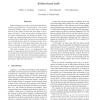Free Online Productivity Tools
i2Speak
i2Symbol
i2OCR
iTex2Img
iWeb2Print
iWeb2Shot
i2Type
iPdf2Split
iPdf2Merge
i2Bopomofo
i2Arabic
i2Style
i2Image
i2PDF
iLatex2Rtf
Sci2ools
108
click to vote
CSFW
2008
IEEE
2008
IEEE
Evidence-Based Audit
Authorization logics provide a principled and flexible approach to specifying access control policies. One of their compelling benefits is that a proof in the logic is evidence that an access-control decision has been made in accordance with policy. Using such proofs for auditing reduces the trusted computing base and enables the ability to detect flaws in complex authorization policies. Moreover, the proof structure is itself useful, because proof normalization can yield information about the relevance of policy statements. Untrusted, but well-typed, applications that access resources through an appropriate interface must obey the access control policy and create proofs useful for audit. This paper presents AURA0, an authorization logic based on a dependently-typed variant of DCC and proves the metatheoretic properties of subject-reduction and normalization. It shows the utility of proof-based auditing in a number of examples and discusses several pragmatic issues that must be add...
| Added | 29 May 2010 |
| Updated | 29 May 2010 |
| Type | Conference |
| Year | 2008 |
| Where | CSFW |
| Authors | Jeffrey A. Vaughan, Limin Jia, Karl Mazurak, Steve Zdancewic |
Comments (0)

